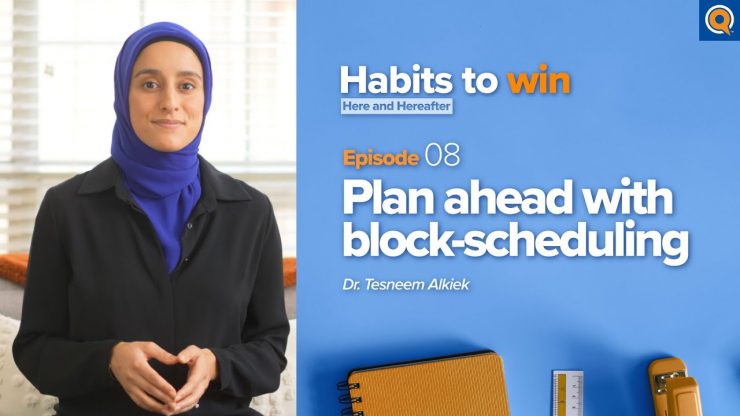Block-scheduling is a powerful habit that can ward off procrastination and up our productivity. As usual, we find that there is a built-in practice us Muslims already have to schedule our day in this style: the five daily prayers.
What is “block-scheduling”
Block-scheduling involves planning out your day, hour by hour. This can be done at the start of the week or the night before. Essentially, you’re creating a skeleton for your day.
For example, every Sunday night think about all of the goals and tasks you need to accomplish that week. Do a brain dump of everything you need to get done on a piece of paper, or the Notes app on your phone. Then, once you’ve identified what you need to do, prioritized each task. Write down which day or days of the week you will work on each task.
For a simple example, your day could look like this. You block off 8am-10am to work on a long-term project that requires your full attention. 10am-12pm is reserved for catching up on class or work-related readings. 12pm-1pm you’ve got a lunch and salah break. 1-3pm you’re back at it in class or work calls. And so on and so forth.
The idea is that you plan out your day beforehand so that once your day begins, you don’t worry about everything that needs to be done.
A solution for proscrastination
Block-scheduling is an extremely effective tool to not only keep you on track of all of your tasks, but to also hold you accountable throughout the day. If you’ve allotted a whole block to getting through a task you’ve been avoiding, procrastinating becomes that much harder. And once you’re done with your initial goal, you know what exactly you’re moving on to without finding excuses to waste time.
Planning your day around salah
Block-scheduling is inherently built in to the life of a Muslim. Praying five times a day, throughout the day, is one of the key pillars in Islam. And what salah does in particular, is that it makes you very much aware of what you’re doing and where you’re going to be throughout the day so that you can plan accordingly.
Whether you’re a full-time student or working, if you block off time in your day to pray and plan everything else around those blocks you’re already practicing block-scheduling.
Download the Habits to Win Here and Hereafter Workbook as you follow along with this series!

